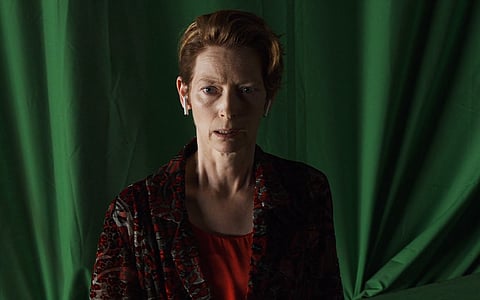
- Reviews
- Power List 2024
- Cannes 2024
- In-Depth Stories
- Web Stories
- News
- FC Lists
- Interviews
- Features
- FC SpecialsFC Specials

We are trained to spot an Almodóvar. For one it's all staged, it all looks staged, it all wants to look staged. In the case of his 30-minute short film, The Human Voice which premiered at the Venice Film Festival last year, more literally so — the entire house in which Tilda Swinton's character lives is a hollowed out film set on a studio floor. (Though this isn't initially apparent. You first see her ambling about a studio floor, and a scene later in a house. It's only a few scenes in, via top-shot you realize that the house is a set, at the edge of the studio floor.) There is a fragility here, everything on the verge of collapse, literally and psychologically, with the free-standing walls propped up by wooden legs, and the sanity propped up by a wafer-thin tether to consequence.
Almodóvar's other stamp of recognition is colour, and texture. So tactile, so pungent, you want to reach across the screen and touch it, or like a brazen character from one of his films, run your tongue along its inviting surface. Take Swinton's character — in a candy apple red ensemble with a turtleneck, she pops sunshine yellow pills to then slump onto a crocodile green silk bed cover under a reproduction of Artemisia Gentileschi's Venus and Cupid (Sleeping Venus), bathed in cobalt blue. All the primary colours, leopard prints, and appliques announce themselves with no shame or modesty.
Everything that is happening in this film, and all his films usually, invite the viewer by the hand into this orgy — a sensual breaking of the fourth wall. This short film, Almodóvar's first in English, begins with Swinton in the iconic bell shaped voluminous velvet red gown from Ballenciaga's Spring/Summer collection last year. From here he follows her for half an hour as she stews in agony, waiting for her lover to call her. "Freely based" on Jean Cocteau's one-women play, here Swinton fixes her ear pods instead of picking up a tethered phone, giving her the luxury of pacing about the luxuriant set, filled with cabinets and sofas from Almodóvar's own collection. (His frequent collaborator Antxón Gómez served as the art director.)
The rest is empty, compelling fun. Swinton's dialogues are pronouncements, padded by the dog's mewling. You don't hear the other side of the call, and so you only hear her responses to questions you have to guess ("Oh I haven't stopped!"), and questions to answers you have to guess (Though she asks only rhetorical questions — "Am I alright? Are you really asking me that?" — content in her word vomit). So removed from reality is this film, this character, this staging — and this isn't a criticism as much a characterization — that at one point I even considered that she was hallucinating this other man, waiting for a phantom. The human voice is at one level hers, but on another, it is this man's voice which can't even be heard or seen embodied, made conspicuous by its absence.
Through collecting clues from one side of this conversation a few things are clear — she's an actress, he left her, he had left her in the past to come back, this time he isn't, there is another woman, she knew about this other woman, she pursued him nonetheless. The whole thing snowballs through a tense score to a final moment of catharsis, or what catharsis could be like.
The short film is a challenge for Almodóvar because his characters so often plonk themselves so righteously, with an entitled air on that thin dividing line between sane and insane, it takes time to warm up to them, to cut through their artifice, and sneak a peek at their pathos; "a mixture of madness and melancholy". Since time has collapsed here, we see Swinton's character's madness through her melancholy. It pads the madness with a bit of empathy but it does little to heighten the melancholy itself. Swinton guzzles through lines as though she is performing — she is performing — and that hypnotic theatrical pretension holds your attention, but elicits little else emotionally. It's an odd thing, at one point she speaks of flinging herself out of the balcony, but her balcony is at floor level of the set. It's almost funny, because of which little feels at stake. Ditto for the visual extravagance of the final moment — visually potent, emotionally vacuous, framed with such pure control you yearn to be one with it.